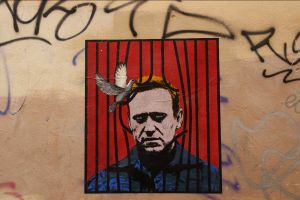Surveys from the Chicago Council and the Levada Analytical Center show that Russians are generally indifferent to Navalny's actions, and more suspect that he staged his own poisoning or it was a "provocation from the West" than believe the Russian government targeted him.
Russian opposition leader Alexei Navalny has been sentenced to three and a half years in prison after he returned to Russia from Germany, where he was being treated for exposure to a nerve agent in August 2020. An investigation into the poisoning, conducted with the help of Navalny, has implicated Russia’s Federal Security Service (FSB). Following Navalny’s arrest and the release of a separate investigation into Russian President Vladimir Putin’s wealth conducted by Navalny, tens of thousands of protesters have taken to the streets across the country to march in support for the jailed Navalny. They were met by a heavy show of force from Russian riot police that included batons, shields, and thousands of arrests. This repressive response prompted US Secretary of State Antony Blinken to condemn “the persistent use of harsh tactics against peaceful protesters and journalists.”
Navalny has inspired popular protests and gathered a large international following. But recent surveys by the Levada Analytical Center, including one in partnership with the Chicago Council on Global Affairs, show that the overall Russian population is generally indifferent to his actions, and more suspect that he staged his own poisoning or it was a “provocation from the West” than believe the Russian government targeted him.
Key Findings
- More Russians express an unfavorable view (49%) of Navalny than a favorable view (25%).
- About half of Russians (51%) say they are neutral or indifferent about his decision to return to Russia (22% approve, 25% disapprove).
- Most Russians (78%) have heard at least something about Navalny’s poisoning. Only 15 percent think it was carried out by the Russian government.
- Navalny’s support is concentrated among younger Russians, aged 18–24 (48% favorable view), and those who get their news from the application Telegram (49% favorable view) as well as other online sources.
More Express Unfavorable than Favorable View of Navalny
Western media sources have applauded Navalny’s bravery in returning to Moscow after his recovery in Germany, but new Levada Center-Chicago Council survey results conducted January 29–February 1, 2021 find that just 25 percent of Russians express a favorable view of Navalny. About half of Russians (49%) say they have an unfavorable view of Navalny while 26 percent respond that it is difficult to say. By contrast, 67 percent have a favorable view of Putin.
A January 2021 Levada Center poll also found that Russians generally view Navalny’s activism negatively. Fifty-six percent of Russians say they disapprove of Navalny’s activities (up from 50% in September 2020) while just 19 percent approve. When asked about Navalny’s return to Russia, 51 percent described their feelings as neutral or indifferent. Among the rest, about as many approve (22%) as disapprove (25%).
Navalny's Return to Russia from Germany
How do you feel about Navalny's return to Russia?
Indifference Is Overwhelming Reaction to Navalny’s Activities
In fact, the general public affect toward Navalny is one of indifference. The prevailing view among Russians is a neutral reaction when presented with a list of words to describe their feelings toward the opposition leader: 29 percent say they are indifferent to him; 16 percent say they cannot say anything good about him; and 14 percent say they cannot say anything bad about him. More Russians say they dislike (12%) or are irritated by (9%) Navalny than say they respect him (10%) or are sympathetic toward him (7%). Supporters of Navalny's activities more often feel a sense of respect for him (45%) or cannot say anything bad (31%). Navalny's critics are more likely to be neutral about him (31%) or cannot say anything good (23%).
Attitude toward Navalny
What words could you use to describe your attitude toward Alexei Navalny?
Plurality of Russians Suspect Navalny Staged His Own Poisoning
Levada Center poll found that most Russians have heard about Navalny's poisoning: 17 percent had been watching the story closely, and an additional 61 percent have heard at least something about it. When asked their assessment of what happened, a plurality believe that Navalny staged the poisoning himself (30%). An additional 19 percent consider it a provocation of Western intelligence services. Fifteen percent see the poisoning as an attempt by the Russian authorities to eliminate a political opponent, and 7 percent say it was an act of personal revenge from one of Navalny’s targets of investigation. At the same time, those who closely follow the case are most likely to consider the poisoning of Navalny by Russian authorities to be the most accurate version.
What Happened to Navalny
There are multiple versions of what happened to Alexei Navalny. Which of them seems the most plausible to you?
Key
A: There was no poisoning, all of it was staged
B: It is a provocation of the Western intelligence services
C: It is the government's attempt to eliminate a political opponent
D: It is a personal revenge of one of Navalny's investigations subjects
E: It is the internal struggle within the opposition
F: Health problems, accidental poisoning, common intoxication
G: Other
H: It is difficult to answer
Navalny’s Base: Younger Russians and Frequent Internet or Social Media Users
Younger Russians, those who use social media, and those who get their information from online sources are most likely to support Navalny. Those 18 to 24 are more likely to approve of Navalny’s activities (36%) and view Navalny favorably (49%) than older Russians. In addition, those who use internet sources and social media are generally more likely to hold a favorable view of Navalny.
More generally, daily users of the internet (30%) and social media (33%) are more likely than average to have a favorable view of Navalny. TikTok (41%), Instagram (38%), or YouTube (36%) users are more likely to support Navalny than those who use the Russian social media site Odnoklassniki (27%). And those who use the messaging app Telegram are especially likely to express a favorable view of Navalny (50%) and to approve of his activities (45%).
Attitudes Toward Navalny's Activities by Age Group and Information Source
Note: Jan. 29 - Feb. 1, 2021 | n = 1,021
By contrast, level of education and region of residence have almost no effect on views of Navalny. Russians with a university degree or higher (27% favorable) are only slightly more likely to have a favorable view of Navalny than those who have only completed high school (21% favorable). And Russians who live in Moscow (27%) or other large cities with more than 500,000 people (26%) are nearly as likely to have a favorable view of Navalny as those who live in rural areas (29%).
Many Familiar with Palace for Putin Film; Little Effect on Views of President
Just two days after Navalny’s arrest, the Anti-Corruption Foundation (FBK), an organization founded by Navalny, released its investigation into Putin’s wealth, which centers on a $1- billion-plus palace on the Black Sea. The protests that have erupted after the release of this investigative documentary, Palace for Putin, are the most widespread in recent years, stretching from Moscow to Vladivostok.
A January–February Levada survey reports that 26 percent of the Russian adult population watched the film and an additional 10 percent are familiar with its content. While more than half think some aspects of the film may be true to some extent, it seems to have had little impact on views toward Putin. The overwhelming majority of those who watched the film, knew its content, or had at least heard about it (77%) did not change their attitude toward the president after its premiere.
The research showed that the investigation of Navalny’s team hasn't influenced the opinion of Putin's supporters but rather entrenched negative attitudes of his critics. Among respondents who have unfavorable views of Putin, 38 percent worsened their attitude to him. Among supporters, only 3 percent declared that their attitude toward Putin worsened. This could be a sign of deepening social conflict in Russian society.
Conclusion
Navalny occupies a unique role in Russia. As the most prominent opposition figure in Russia, he has inspired people to take to the streets from one end of the country to the other to protest Putin’s regime and corruption. The advent of social media has helped Navalny connect to younger and more independent-minded citizens and underscores the impact of independent news sources among the next generation. But Navalny will now be muzzled to some extent behind bars. Beyond that, these results show that any efforts to change the system run up against not only the strong hand of the state but also a sense of social inertia and doubt that there is any alternative in today’s Russia.
Methodology
This analysis is based on data from two Levada Analytical Center surveys, conducted in December 2020 and January–February 2021. The surveys were conducted December 21–23, 2020, and January 29–February 2, 2021, among a representative sample of all Russian urban and rural residents. The samples respectively comprised 1,617 and 1,616 people 18 or older. In December, the survey was conducted as telephone interviews (CATI) on a random sample (RDD) of personal phone numbers and landlines. In January, the survey was conducted as a personal interview in respondents’ homes.
The Levada Center has been included in the Russian registry of noncommercial organizations acting as foreign agents.
Read the director of the Levada Center’s statement of disagreement with this decision.









